Under-resourced and over-worked

Tom Nathan on the FDA’s report into the financial and administrative challenges present in the justice system, its advice for the new government on increasing prosecutions of Rape and Serious Sexual Offences, and next steps to ensure the union’s message is heard.
While the results of the FDA’s recent survey of CPS staff unfortunately weren’t surprising, they still painted a shocking picture of court backlogs and the subsequent workload pressures on prosecutors.
A total of 92% agreed that current court backlogs inhibit the prosecution of Rape and Serious Sexual Offences, with 86% saying that their current workload was affecting their ability to maintain a work-life balance. Technology also proved to be a huge issue, with just under three out of four agreeing that problems with technology inhibit their ability to work effectively.
The survey results formed the basis of the union’s report into the barriers faced by prosecutors, particularly when prosecuting Rape and Serious Sexual Offences (RASSO).
The report found that CPS staff and the courts system they work in are under-resourced, leading to longer backlogs and poorer outcomes for victims of the most serious sexual offences.
Despite the previous and current government acknowledging that these RASSO cases should be a political priority, recent government data released in 2023 has shown that RASSO offences are taking up to three years from an offence being recorded to a court verdict. For the CPS specifically, victims are waiting for more than a year from a police charge to a court verdict.
Removing barriers
The low rate of prosecutions has been caused by a number of interlinking factors, including the increasing complexity of cases, changes in the profile of staff in both the CPS and the police, increases in reporting and the courts backlog.
Through the eyes of those working on the frontline of RASSO cases, our report focuses on how the FDA feels these problems can be fixed.
The FDA’s new report highlights the lack of resourcing in the CPS and the wider criminal justice system. It focuses on the CPS’s role in increasing prosecutions of Rape and Serious Sexual Offences (RASSO), and looked at what barriers our CPS members face on a daily basis and the resources they need to remove them.
The report provides analysis from our members in the CPS about the internal and external barriers they face when prosecuting RASSO.
With contributions from key legal organisations and victims’ charities, the report calls for a consistent direction of policy and additional resourcing of the justice system to increase prosecutions of RASSO.
The report found that staff and the courts system they work in are under-resourced, leading to longer backlogs and poorer outcomes for victims of the most serious sexual offences. It calls for full investment in the courts’ system as well as new ways of working in order to help the government meet its target of halving Violence Against Women and Girls (VAWG).
It concludes that while the issues are complicated, involving not just the CPS but also the police and the courts, proper resourcing would help many of the biggest problems to be alleviated. Specifically, hiring, training and retaining lawyers and judges, specialised police officers, and specialised independent support for victims, fixing the courts estate and more effectively managing the digital transition in evidence collection and analysis.
At the report’s publication, FDA General Secretary Dave Penman said that to cut VAWG and RASSO cases the government “must listen to the voices of prosecutors and provide adequate funding and improve the organisation of the criminal justice system. This report is clear – without improved resourcing, no government can achieve a significant increase in prosecutions and deliver justice for the victims of these terrible crimes”.
Summary of recommendations
In consultation with CPS staff, the following points were considered to be the important consensus points that could help significantly to bring down waiting times and increase prosecution rates for RASSO victims. It is worth noting that there are very few quick fixes in a complex and multi-departmental problem like RASSO prosecutions, but many are cases of investment over the medium term leading to clear and sustainable increases in prosecution rates.
The report calls for:
- A VAWG (Violence Against Women and Girls) and RASSO prevention strategy which includes improving outcomes within the justice system for victims.
- Specialist RASSO courts which include more effective guidance for juries and judges.
- Full commitment to funding the National Operating Model and Operation Soteria – a framework created in collaboration with the police, academics and the CPS for investigating RASSO cases.
- A workforce strategy which includes a published long-term strategy to recruit additional criminal lawyers, with a particular emphasis on RASSO lawyers.
- Fixing the HM Courts and Tribunal Service estate.
- Priority listing and guaranteed fixtures for all rape and sexual offence cases.
- Increased support for victims of RASSO.
Report launch in Parliament
In order to put the report in the spotlight, in autumn 2024 it received its official launch at the Houses of Parliament in Westminster, The event was attended by FDA members, MPs, journalists and representatives from professional legal bodies, advocacy groups and charities.
Hosted by Alex Brewer MP, the event included a panel chaired by Times journalist and Chair of The Times’ Crime and Justice Commission, Rachel Sylvester. FDA National Convenor for the CPS Stephen Head represented the union on the panel and was joined by Chair of the Bar Council Sam Townend KC, Chair of the Criminal Bar Association’s RASSO Group Kama Melly KC, and Head of Public Affairs and Policy at Rape Crisis England and Wales Amelia Handy.
The panel came together to call for additional resources for the CPS and the justice system to improve outcomes for victims.
Head took attendees through the report, including a number of internal barriers CPS staff face, including the increased complexity of cases due to the proliferation of digital evidence and poor technology. The report also covered the adverse impact of high staff burnout and turnover. Head told attendees that of course prosecutors want to deliver justice but “they need the resources to be able to get that right”. Giving an example of the resourcing pressures faced by prosecutors, Head discussed the difficulties of managing increased digital evidence (such as mobile phone, body-worn cameras and CCTV footage) which mean cases can take significantly longer.
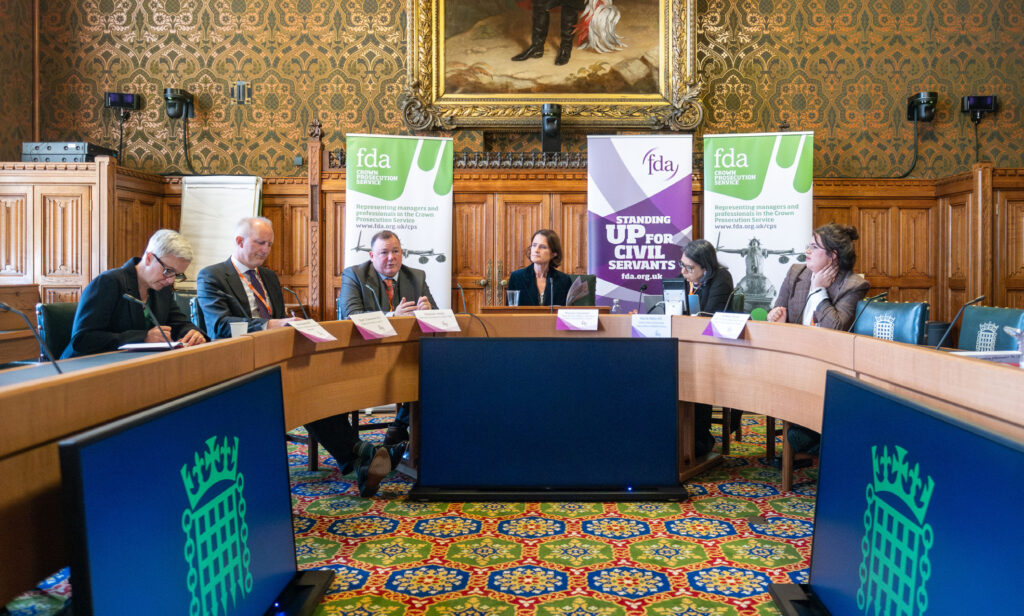
The report has also gained widespread support from advocacy groups, charities, think tanks, and professional bodies. At the launch, Chair of the Criminal Bar RASSO Group, Kama Melly KC, said the key challenges in RASSO prosecutions are “a lack of resources and a declining population of experienced prosecutors”.
Head of Public Affairs and Policy at Rape Crisis England and Wales, Amelia Handy, warned that her organisation also felt that the “broken courts system” is “unable to keep pace”. She stressed the importance of a holistic approach that covers all areas of the justice system and the country rather than the current experience of “a postcode lottery”.
Stating that the report “clearly set out the challenges at the Crown Prosecution Service as seen from the inside”, Chair of the Bar Council, Sam Townend KC added that the CPS “undoubtedly needs more resources” for RASSO cases: “The justice system itself has been woefully underfunded for more than a decade and desperately needs new investment”.
FDA General Secretary Dave Penman compared the funding crisis in criminal justice to that of the NHS, of which Prime Minister Keir Starmer has said “we have to fix the plumbing before we turn on the taps”. Penman said the FDA’s report must be used to persuade the government to treat justice in the same way.
Update: Solicitor General announces additional funding and staff
Since the report launch, then-Solicitor General Sarah Sackman KC MP has confirmed that the CPS will be receiving additional funding to support the victims of crime and to recruit additional staff in specialist RASSO units.
The CPS will receive £49 million, allocated to the CPS from the Budget. This is equivalent to an annual real terms increase of 7.5% over this financial year and the next.
This money includes funding for specialist prosecutors to work on RASSO cases, “further funding to support victim transformation programmes and develop use of cutting edge technology”.

Following the funding announcement Sackman praised the work of CPS prosecutors, adding that she knows they “will play a vital role in our ambitious missions to halve violence against women and girls in a decade, deliver swifter justice for victims, and double down on knife crime as we make our streets safer for everyone”.
FDA National Officer for the CPS Duncan Woodhead called the announcement “a welcome step [which] acknowledges the need to address the backlog in – and improve the outcomes of – RASSO prosecutions as part of the government’s mission to halve Violence Against Women and Girls.
However, Woodhead highlighted that “our report, based on the experiences of hundreds of FDA members, sets out several further steps the government needs to take to improve outcomes for RASSO victims.
“RASSO cases account for a high proportion of cases stuck in the Crown Court backlog, so any additional funding needs to be significant and sustained. The government must also consider a workforce strategy which includes a long term plan to recruit additional criminal lawyers, fixing the courts estate and priority listing and guaranteed fixtures for all RASSO cases.”
Next steps: FDA submits evidence to MPs’ inquiry into Crown Court backlogs
Using the findings of our report, the FDA has submitted written evidence to the current Public Accounts Committee (PAC) inquiry into Crown Court backlogs. Made up of cross-party Members of Parliament, PAC oversees government expenditure and looks at the efficacy of this spending.
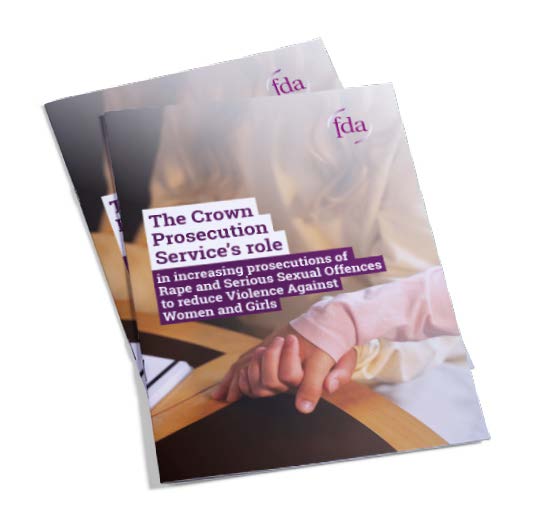
The FDA’s submission provides the unique insight of prosecutors into the inquiry’s remit, covering a number of significant subjects including progress addressing backlogs, workforce issues, impact on victims, witnesses and defendants, and oversight and planning across the courts system.
FDA National Officer representing CPS, Duncan Woodhead, said: “Our submission to this inquiry is a great opportunity to get the report’s recommendations in front of key legislators’, who are examining the issues impacting our CPS members working lives.”
The FDA will continue to engage with the government and ministers to improve outcomes in the criminal justice system and for our members in the workplace.
Latest news
-
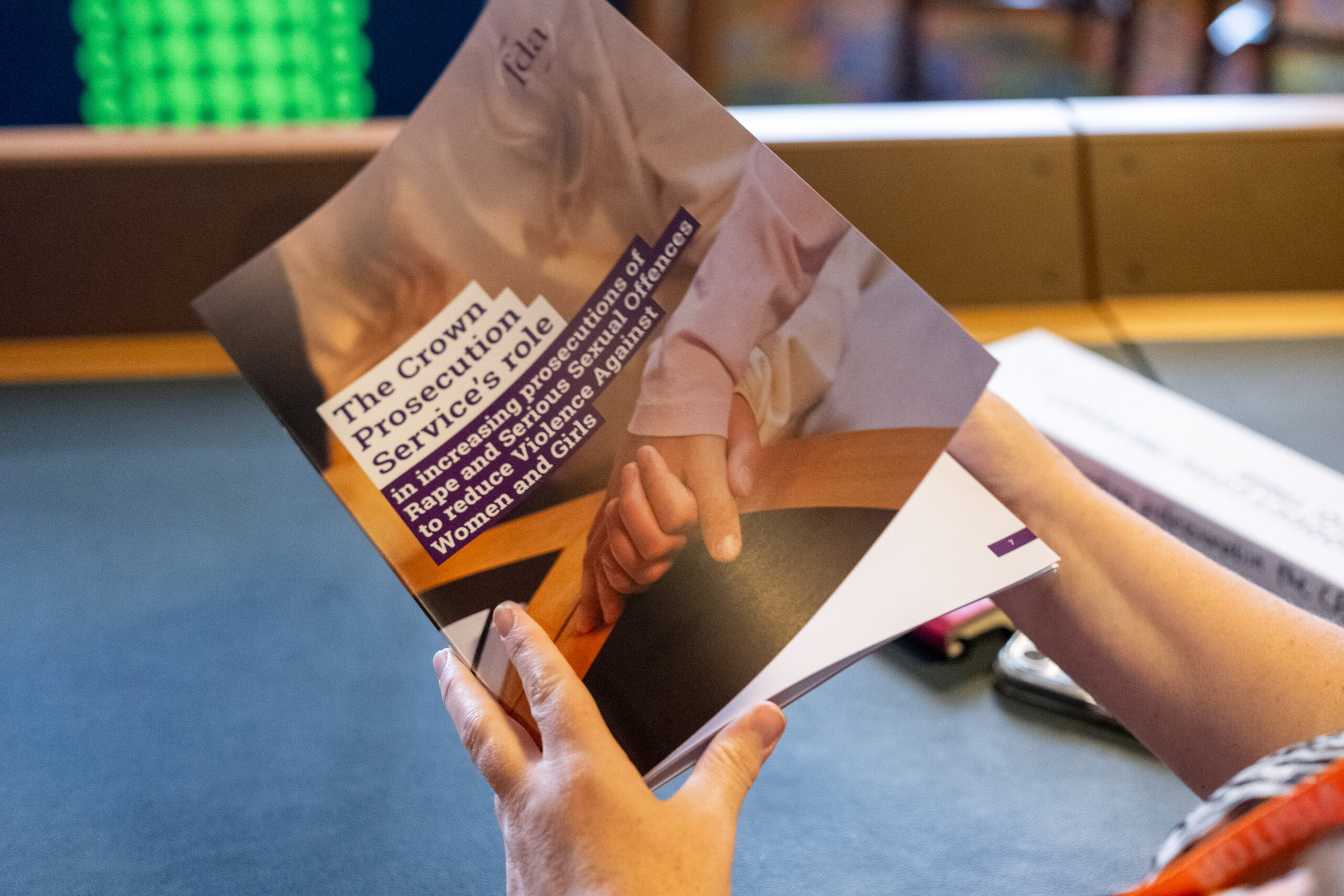
FDA welcomes additional CPS funding to support victims of crime
The FDA has welcomed that the CPS will be receiving additional resources. The announcement follows the recent publication of the FDA’s report examining the CPS’s role in increasing RASSO prosecutions.
-
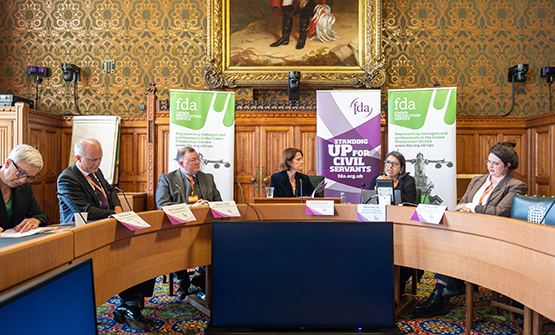
CPS must have additional resourcing to increase RASSO prosecutions, Parliamentary event hears
Last week in Parliament the FDA launched a new report calling for consistent direction of policy and additional resourcing of the justice system, in order to increase prosecutions of serious sexual offences.
-
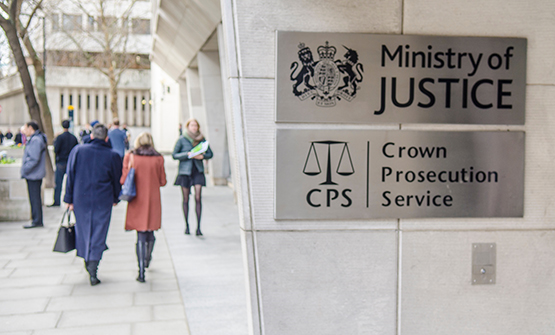
There is no “cherry-picking” of cases in the CPS
The FDA’s Duncan Woodhead says justice can only be served when police and prosecutors work together, and all parts of the system are properly funded and resourced.